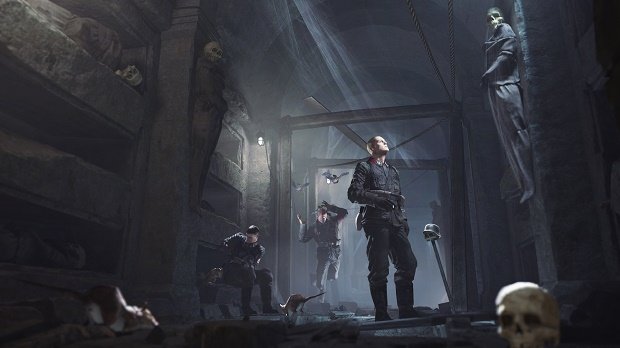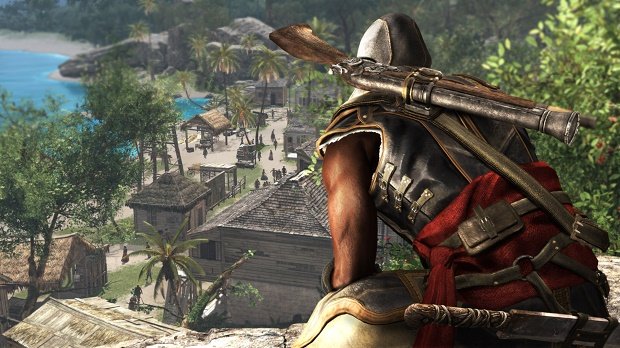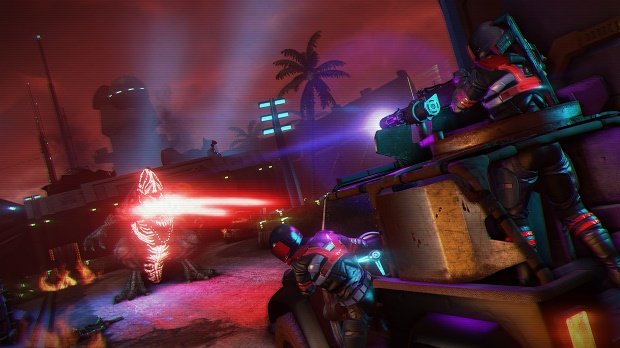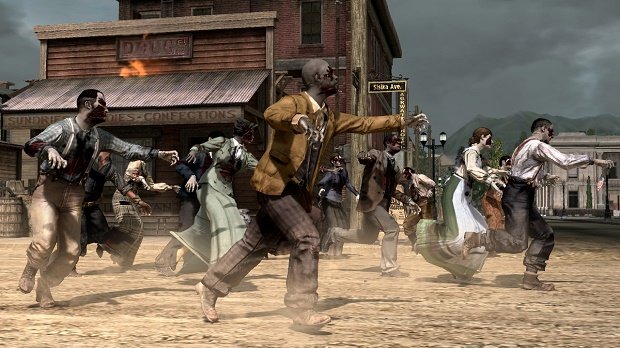More stand-alone DLC, please!
I loved Wolfenstein: The New Order. It's actually one of my favorite games of 2014. I also promptly traded it in after I finished its 12-hour-long campaign, so when I heard that Bethesda was releasing a prequel expansion, I was excited (because yay! More Wolfenstein!) and worried (because I don't want to buy the game again just to play some DLC). Turns out I don't have to be concerned, because Wolfenstein: The Old Blood is going to be a stand-alone experience. I can just buy it and play it without having to own the original game. This should be far more common than it actually is.

Publishers release DLC for a variety of reasons. It's a good way extend the value of a product by letting fans buy a little bit more of something they already like. They're relatively inexpensive to produce, as they reuse art assets, sounds, and other important bits to fill in much of the gaps of development. DLC is also used to entice players to hold onto a game for just a little bit longer before selling it off, thus preventing someone else from buying it without giving the publisher a cut. But what about those people who trade in their games, regardless of what additional content may be promised down the pipeline? Most downloadable content needs to hit a sweet spot of players who still own the game and are willing to spend more money on it, and I'm sure that Venn diagram is much smaller than most publishers would like.
I'm not the kind of person to hang onto a game for more than a few months. As such, there are quite a few games out there with DLC that I've never had a chance to play. The Citadel DLC for Mass Effect 3. The Tyranny of George Washington for Assassin's Creed 3. Most of what came out for Borderlands 2. And so on. I know I'm not the only one out there like this, if my local GameStop's used game stock is any indication.

But if that DLC is released on its own, I can purchase it regardless of whether or not I own the original game. This happened last year with Assassin's Creed 4's Freedom Cry DLC. By the time it hit PSN, I'd already sold my copy and moved on to the next game in my backlog. It was unfortunate, considering all the good things I'd heard about the Adewale-focused tale and its take on the horrors of slavery. Lucky for me (and probably thousands of other curious fans), Ubisoft made it available as a stand-alone purchase a few months later. For $15, I got a decent five-to-six-hour-long story that gave me a bit more insight into one of Assassin's Creed's most interesting characters. Ubisoft did something similar with the totally bonkers Far Cry 3: Blood Dragon, and because everything about that neon-tinged '80s-fest was so divorced from the story of Far Cry 3, it made sense to sell it as a separate download.
In addition to roping in fans who've long since sold off their copy of the game, stand-alone DLC is a great way to give people who aren't quite willing to drop $60 an opportunity to try a microcosm of the original for a fraction of the price. Aren't quite sure you'll like Forza Horizon 2 or Infamous: Second Son? Pick up Forza's Fast & Furious DLC or Infamous: First Light for a lighter sampling of the full thing, and you can still walk away satisfied thanks to their self-contained stories and gameplay.

What makes DLC in general such an appealing proposition for publishers is that much of the hard work is already done. Developers don't have to build an engine or worry about overall design. That stuff's done already, so teams can worry about creating more focused, bite-sized tales. Stand-alone DLC is even better, because developers can create larger experiences that fit somewhere between smaller DLC quest packs and full-fledged sequels. When Wolfenstein: The Old Blood comes out for $20 later this year, we won't expect a full 12-hour evolution of the series. Instead, we'll simply get an extension of what already came before, another taste of a game that we already like, without having to wait another two to three years for the next entry to get made.
And by separating the content, designers can even experiment with some pretty strange ideas without having to worry about alienating fans of the original game. Take stand-alone DLC like Infamous: Festival of Blood or Red Dead Redemption: Undead Nightmare. These totally-not-canon entries throw their game's heroes into worlds filled with vampires and zombies, respectively, and can get away with it because they're clearly isolated from their source material.
Sign up to the GamesRadar+ Newsletter
Weekly digests, tales from the communities you love, and more

Admittedly, stand-alone DLC doesn't make sense in every instance. With Borderlands or Diablo, you really need each additional set of quests to take place in a larger overarching game, so you can continue to use that barbarian or gunzerker you've been running around with for the past 100 hours. But in the case of something like BioShock Infinite's Burial at Sea expansion, there's no reason why it couldn't exist as a separate download. Its length of play and relation to BioShock Infinite (and even the original BioShock) are enough to make it feel like a video game novella, tying in with several games' worth of mythology but able to stand on its own merits as a complete experience. Plus, episode one was released nearly nine months after Bioshock Infinite, with episode two coming four months after that. That's a long time to expect someone to hang onto a ten-hour-long single-player game, and by releasing that expansion separately, 2K could have seen increased sales from curious gamers who aren't exactly willing to re-buy a game they'd already played and sold.
With the amount of time it takes for AAA games to get made, I'm glad publishers like Sony and Bethesda are willing to let its developers take chances on smaller, stand-alone experiences to fill in the gaps between releases. DLC can give old games a new lease on life, and allowing that content to exist without requiring a previous purchase opens it up to a potentially larger audience. It might not always make sense, but if there's a way to partition that content out and sell it on its own, by all means, do it. I probably don't own the original any more anyway.



